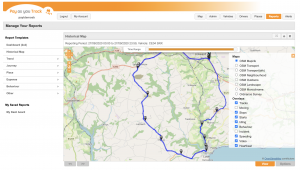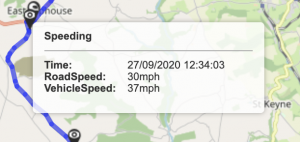
5 Ways to Save Money with Our Dashcam
October 7, 2020
Are Your Assets Safe This Winter?
November 30, 2020
Global warming is an issue we have to face together. By 2025 the government has vowed to reduce the UK’s CO2 emissions by 80% compared to 1990 levels. With more than a quarter of the UK’s greenhouse gas emissions coming from the transport sector, it is the responsibility of fleet owners to implement a solution to lower these figures. The transport sector is an integral part of our economy, generating 20% of the EU’s GDP and supporting 16 million jobs. Eliminating vehicles from our roads is not a feasible solution and for many companies, the cost of switching to electric vehicles is too expensive and impractical. Fortunately, telematics provides an inexpensive solution. Telematics can save your company thousands of pounds and have a huge positive impact on the environment.
Did you know, 66% of people are willing to buy more from or work with companies committed to positive environmental impact?
How can reducing your fuel consumption save your company money and help the environment?
Fuel is notoriously expensive, often being one of the biggest company costs. It’s important to be as efficient with your fuel as possible to cut costs and reduce greenhouse gas emissions. Pay as you Track can help you understand where unexpected fuel expenses come from. Our system can help you become a greener fleet by:
Reducing vehicle idling time

Pay as you Track’s Telematics lets you customize how you’d like to view your historical maps.
A fleet driver’s day is often filled with long journeys, rest breaks, and on and offloading. Idling times are an inevitable expenditure but can easily become an issue when done so excessively. This often happens due to poor driver behaviour or vehicle monitoring and can quickly become detrimental to your company’s finances. Telematics can provide a swift solution to make sure your fuel is used efficiently. Alongside reducing your carbon footprint, reducing vehicle idling improves the health of your fleet and reduces unforeseen maintenance costs. Our telematics solution gives you the opportunity to view and address excessive idling times.
Improving driver behaviour
Drivers are an integral part of the transport industry. However, a lack of monitoring and training can lead to issues that cost your company. Drivers can deviate from their routes causing unnecessary fuel usage. There is also the risk that drivers will use fleet vehicles for their own personal use. By monitoring your drivers’ behaviour through our telematics, you can make sure they are driving safely and efficiently. We provide the tools needed to easily track your drivers’ stops and starts, idling times, vehicle speeds, and location history.

Pay as you Track’s telematics monitoring speeding.
Reducing your traffic congestion
There is a strong link between the economic and environmental impacts of congestion in the transportation system. Studies carried out by The Intelligent Mobility Report state that vehicles travelling at 37mph emit 40% less carbon emissions than vehicles travelling at 12mph. It’s important that your vehicles stay on the move and don’t find themselves crawling in traffic. In the EU, 24% of all driving is spent in traffic congestion, costing 1% of the entire EU’s annual GDP. Fortunately, the introduction of telematics can reduce congestion and allow for smoother running traffic. By freeing up road capacity, it reduces the need for additional roads that often destroy natural habitats. This can help improve fleet productivity by reducing the time your fleet is in transit.
How Pay as you Track’s telematics can make you a greener fleet:
The Impact Study on Intelligent Mobility reveals that the implementation of telematics has helped fuel consumption decrease up to 15% and reduce traffic congestion by up to 30%. Using Pay as you Track’s telematics you can influence your drivers’ behaviour, encouraging efficient driving that reduces fuel consumption and vehicle emissions.
Telematics provides the ideal way to become a greener fleet, save money and improve your company image. As 2020 has been a financially unreliable year, it’s understandable that fleets may be sceptical to tie themselves into a contract with a telematics company. Pay as you Track offers a unique no-contract solution so that you only pay for the days you use. Read here about how our no-contract solution has saved small businesses thousands of pounds in 2020.
Ready to take the first step towards a greener fleet? Get in contact with us using our form, call us on 0161 914 5500 or email us at [email protected].
Cited Sources:
https://greenfleet.net/features/20072015/telematics-future-fleet-management
https://www.telematics.com/wp-content/uploads/2013/10/Impact-Study-on-Intelligent-Mobility.pdf
